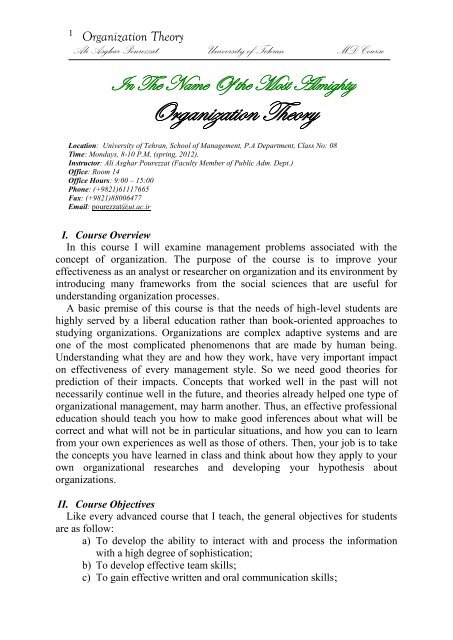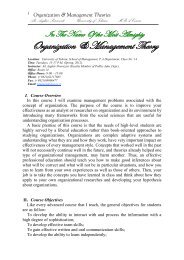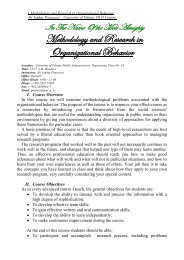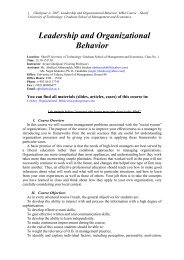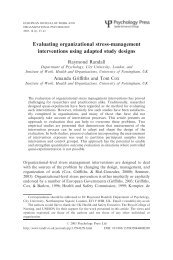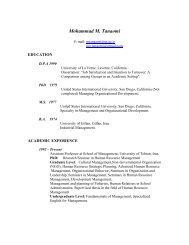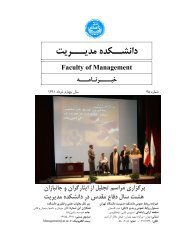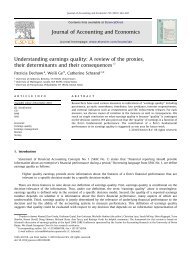Organization Theory Ali Asghar Pourezzat University of Tehran MD ...
Organization Theory Ali Asghar Pourezzat University of Tehran MD ...
Organization Theory Ali Asghar Pourezzat University of Tehran MD ...
You also want an ePaper? Increase the reach of your titles
YUMPU automatically turns print PDFs into web optimized ePapers that Google loves.
1<br />
<strong>Organization</strong> <strong>Theory</strong><br />
<strong>Ali</strong> <strong>Asghar</strong> <strong>Pourezzat</strong> <strong>University</strong> <strong>of</strong> <strong>Tehran</strong> <strong>MD</strong> Course<br />
In The Name Of the Most Almighty<br />
<strong>Organization</strong> <strong>Theory</strong><br />
Location: <strong>University</strong> <strong>of</strong> <strong>Tehran</strong>, School <strong>of</strong> Management, P.A Department, Class No: 08<br />
Time: Mondays, 8-10 P.M, (spring, 2012).<br />
Instructor: <strong>Ali</strong> <strong>Asghar</strong> <strong>Pourezzat</strong> (Faculty Member <strong>of</strong> Public Adm. Dept.)<br />
Office: Room 14<br />
Office Hours: 9:00 – 15:00<br />
Phone: (+9821)61117665<br />
Fax: (+9821)88006477<br />
Email: pourezzat@ut.ac.ir<br />
I. Course Overview<br />
In this course I will examine management problems associated with the<br />
concept <strong>of</strong> organization. The purpose <strong>of</strong> the course is to improve your<br />
effectiveness as an analyst or researcher on organization and its environment by<br />
introducing many frameworks from the social sciences that are useful for<br />
understanding organization processes.<br />
A basic premise <strong>of</strong> this course is that the needs <strong>of</strong> high-level students are<br />
highly served by a liberal education rather than book-oriented approaches to<br />
studying organizations. <strong>Organization</strong>s are complex adaptive systems and are<br />
one <strong>of</strong> the most complicated phenomenons that are made by human being.<br />
Understanding what they are and how they work, have very important impact<br />
on effectiveness <strong>of</strong> every management style. So we need good theories for<br />
prediction <strong>of</strong> their impacts. Concepts that worked well in the past will not<br />
necessarily continue well in the future, and theories already helped one type <strong>of</strong><br />
organizational management, may harm another. Thus, an effective pr<strong>of</strong>essional<br />
education should teach you how to make good inferences about what will be<br />
correct and what will not be in particular situations, and how you can to learn<br />
from your own experiences as well as those <strong>of</strong> others. Then, your job is to take<br />
the concepts you have learned in class and think about how they apply to your<br />
own organizational researches and developing your hypothesis about<br />
organizations.<br />
II. Course Objectives<br />
Like every advanced course that I teach, the general objectives for students<br />
are as follow:<br />
a) To develop the ability to interact with and process the information<br />
with a high degree <strong>of</strong> sophistication;<br />
b) To develop effective team skills;<br />
c) To gain effective written and oral communication skills;
2<br />
<strong>Organization</strong> <strong>Theory</strong><br />
<strong>Ali</strong> <strong>Asghar</strong> <strong>Pourezzat</strong> <strong>University</strong> <strong>of</strong> <strong>Tehran</strong> <strong>MD</strong> Course<br />
d) To develop the ability to learn independently;<br />
e) To make continuous improvement during the course.<br />
At the end <strong>of</strong> this course students should be able to:<br />
a) To weight the relevance <strong>of</strong> O.T. 1 in management practice;<br />
b) To identify and explore organizational factors, including organizing,<br />
structuring, institutionalizing, imagination, apprising, evaluating,<br />
diversity, and system, which may influence organizational processes;<br />
c) To point out and discuss how certain organizational theories develop;<br />
d) To learn how you can theories your experiences and observations<br />
about organizations;<br />
e) To apply research methods and methodological skills to analysis<br />
organization processes and designing a better type <strong>of</strong> organization;<br />
f) To identify organizational processes that may favorably influence the<br />
structure <strong>of</strong> social systems;<br />
g) To understand the nature, scope and historical literature <strong>of</strong> O.T.;<br />
h) To understand the variety <strong>of</strong> academic disciplines that have<br />
contributed to the theories and practices <strong>of</strong> O.T.;<br />
i) To see, understand and appreciate theories, facts, events, issues,<br />
problems, and alternative solutions from more than a single<br />
perspective in relation <strong>of</strong> O.T.<br />
III. Required Text:<br />
1. Scott, W. Richard & Gerald F. Davis, 2007. <strong>Organization</strong> and<br />
Organizing: Rational, Natural, Open system perspectives, Pearson<br />
Education.<br />
IV. Further Readings:<br />
Books:<br />
1. Morgan, Gareth. 2006. Images <strong>of</strong> <strong>Organization</strong>. Updated edition, Sage.<br />
2. Hatch, Mary Jo. & Ann L. Cunliffe, 2006, <strong>Organization</strong> <strong>Theory</strong>:<br />
Modern, Symbolic and postmodern perspectives. Oxford Press.<br />
3. Mintzberg, Henry, 1989, Mintzberg on Management: Inside Our<br />
Strange World <strong>of</strong> <strong>Organization</strong>s, Free Press.<br />
Articles:<br />
1. Hatch, Mary Jo & Schultz, Majken, 1997, "Relations between<br />
organizational culture, Identity and image", European Journal <strong>of</strong><br />
Marketing, Vol. 31 No. 5/6: 356-365.<br />
2. Hatch, Mary Jo, 2002, "Essai: Doing Time in <strong>Organization</strong><br />
<strong>Theory</strong>", <strong>Organization</strong> Studies, Vol. 23 No.6: 869-875.<br />
1 <strong>Organization</strong> <strong>Theory</strong>
3<br />
<strong>Organization</strong> <strong>Theory</strong><br />
<strong>Ali</strong> <strong>Asghar</strong> <strong>Pourezzat</strong> <strong>University</strong> <strong>of</strong> <strong>Tehran</strong> <strong>MD</strong> Course<br />
3. Hatch, Mary Jo, 1998, "Jazz as a Metaphor for Organizing in the 21st<br />
Century", the Vancouver Academy <strong>of</strong> Management Jazz Symposium,<br />
<strong>Organization</strong> Sciencea'oi 9, No. 5, September-October.<br />
4. Morgan, Gareth, 1981, "the Schismatic Metaphor and its implication<br />
for organizational analysis", <strong>Organization</strong>al studies, Vol. 2, No.1: 23-<br />
44.<br />
5. <strong>Pourezzat</strong>, <strong>Ali</strong> <strong>Asghar</strong> & Ghazaleh Taheri Attar, 2009, "Pr<strong>of</strong>essional<br />
Adhocracy, an Appropriate Design for Knowledge Economy in the<br />
Light <strong>of</strong> Mintzberg’s Perspective" Journal <strong>of</strong> Electronic Commerce<br />
in <strong>Organization</strong>s, 7(4), 1-20, October-December 2009.<br />
6. Hatch, Mary Jo, 1993,"the dynamics <strong>of</strong> organizational culture",<br />
Academy <strong>of</strong> management Review, Vol. 18, No .4: 657-693.<br />
7. Hatch, Mary Jo & Jones O. Michael, 1997, "Photocopylore at work:<br />
Aesthetics, Collective Creativity & Social Construction <strong>of</strong><br />
<strong>Organization</strong>s", Studies in Culture, <strong>Organization</strong> & Society, Vol. 3:<br />
263-287.<br />
8. Fredrickson H. George, 2000, "Can Bureaucracy Be Beautiful?"<br />
Public Adm. Review Jan. /Feb., Vol. 60, No.1.<br />
9. Maravelias Christian, 2003, "Post-Bureaucracy-Control through<br />
pr<strong>of</strong>essional freedom", Journal <strong>of</strong> <strong>Organization</strong>al Change<br />
Management, Vol. 16, No. 5.<br />
10.McKenzie D. Kenneth & Robert House, 1978, "Paradigms<br />
Development in Social Science: A proposed research strategy",<br />
Academy <strong>of</strong> Management Review.<br />
11.Morgan Gareth, 1980, "Paradigms, Metaphors & Puzzle in<br />
organization theory", Administrative Science Quarterly.<br />
12. Hassard, John, 1999, "Post-modernism philosophy & Management:<br />
Concepts & Controversies", International Journal <strong>of</strong> Management<br />
Review, Blackwell Publisher Ltd.:172-195.<br />
13. Scott William, "<strong>Organization</strong> <strong>Theory</strong>: a Reassessment", Academy <strong>of</strong><br />
Management Review, Vol. 17, No. 2:242-254.<br />
14. Giogie, A. Dennis, & Evelyn Pitre, 1990, "Multi-Paradigm<br />
Perspective on theory building ", Academy <strong>of</strong> Management Review,<br />
Vol. 15, No. 4:584-602.<br />
15. Deets Stanely, 1996, "Describing Differences in approaches to<br />
organization science; Rethinking Burrell & Morgan & their legacy",<br />
<strong>Organization</strong> Science, Vol. 7, No. 2.<br />
16. Gibson Burrell, 1994, "Modern & Postmodern organization analysis<br />
4: the contribution <strong>of</strong> Jurgen Habermass", <strong>Organization</strong> Science, Vol.<br />
15, No. 1:1-45.
4<br />
<strong>Organization</strong> <strong>Theory</strong><br />
<strong>Ali</strong> <strong>Asghar</strong> <strong>Pourezzat</strong> <strong>University</strong> <strong>of</strong> <strong>Tehran</strong> <strong>MD</strong> Course<br />
17. Cooper Robert & Gibson Burrell, 1988, "Modern & Postmodern<br />
organization analysis 4: An Introduction", <strong>Organization</strong> Science, Vol.<br />
9, No. 1:91-112.<br />
18. Henry Nicholas, 1975, "Paradigms <strong>of</strong> Public Administration", Public<br />
Administrative Review.<br />
V. Procedures and Expectations<br />
1. We expect students to complete assigned readings on time and show<br />
up in the class prepared to discuss them. Participation in class<br />
discussions is encouraged and expected. Students are encouraged to<br />
speak out in class to ask questions and express ideas and opinions.<br />
Except under unusual circumstances, assignment grades will be<br />
reduced if they are not handed over on time. Assignments are due at<br />
the beginning <strong>of</strong> class on the date indicated. Any assignment turned<br />
in after this time is considered late. Late assignments will receive a<br />
50 percent reduction in points awarded.<br />
2. Classroom Etiquette: While we disagree with other’s ideas, we should<br />
respect to them and appreciate our common bond <strong>of</strong> human dignity.<br />
In order to have a positive and safe learning environment, we as a<br />
class will have to agree to disagree at times. Some <strong>of</strong> us may have<br />
strong feelings and/or reactions to class materials, readings, etc.<br />
Expressing these reactions is encouraged as long as this is done in a<br />
respectful manner. Hostile and/or disrespectful behavior is not<br />
allowed. In addition, we must be watchful not to take up too much<br />
“airtime” and allow for everyone to share. Talking a lot is generally<br />
not a good way <strong>of</strong> actively participating. Instead, carefully listening to<br />
others and clearly and concisely expressing your input is the best<br />
strategy. Remember to address each other when talking rather than<br />
directing your comments to me unless they are solely intended for<br />
me.<br />
3. Class attendance is required throughout the semester and on-time<br />
attendance is considered mandatory. Coming to class late is a<br />
disruption to all members <strong>of</strong> the class.<br />
4. Communication: Please come and visit me during <strong>of</strong>fice hours. I am<br />
waiting for you to discuss readings, lecture, grading, exams, and<br />
classroom behaviors. If you cannot come to scheduled <strong>of</strong>fice hours,<br />
please let me know and I will work something else out. The best way<br />
to reach me is through e-mail. I will communicate with the class<br />
through email. I expect each <strong>of</strong> you to check email on a daily basis.<br />
5. Academic Ethics: Dishonesty and cheating <strong>of</strong> any kind will not be<br />
tolerated. Plagiarism is a particular form <strong>of</strong> dishonesty that presents<br />
the work, ideas, or words <strong>of</strong> another without attribution as if they
5<br />
<strong>Organization</strong> <strong>Theory</strong><br />
<strong>Ali</strong> <strong>Asghar</strong> <strong>Pourezzat</strong> <strong>University</strong> <strong>of</strong> <strong>Tehran</strong> <strong>MD</strong> Course<br />
were your own. It applies to various tasks, including assignments and<br />
papers. In written work it is important to cite the original author when<br />
your ideas have been developed in previously published or<br />
unpublished work.<br />
6. Students must turn <strong>of</strong>f cell phones and beepers during the class time.<br />
7. Students should not bring guests to class unless approved by the<br />
instructor.<br />
8. Students should not disrupt class by struggling conversations during<br />
the class time.<br />
9. All assignments must be typed or generated by a word processor.<br />
Handwritten assignments will not be accepted.<br />
10. Exams will be in essay format. Exam material would include<br />
lectures, in-class discussions, and assigned readings. Every effort<br />
should be made to attend class on exam day. If an emergency arises, a<br />
make-up date may be established. Note that the content <strong>of</strong> make-up<br />
exam will be substantially different than the content <strong>of</strong> the usual<br />
exam. Please be careful! There is not any make up for final exam.<br />
11. The instructor reserves the right to amend and/or change class<br />
policies and procedures.<br />
12. The instructor shall strive to assign grades that are reasonable,<br />
accurate reflections <strong>of</strong> student performance, and fair to other students.<br />
The final grade will be allocated between these assignments as<br />
follows:<br />
Class assignment, such as presentation & etc 4<br />
Selection <strong>of</strong> the best sentence <strong>of</strong> each chapter 2<br />
<strong>of</strong> the book (Scott & Davis) (14*5=70)<br />
Selection <strong>of</strong> the best sentence <strong>of</strong> each selected 2<br />
Article (10*5=50)<br />
Review Paper 4<br />
Exam 8<br />
Total 20
6<br />
<strong>Organization</strong> <strong>Theory</strong><br />
<strong>Ali</strong> <strong>Asghar</strong> <strong>Pourezzat</strong> <strong>University</strong> <strong>of</strong> <strong>Tehran</strong> <strong>MD</strong> Course<br />
VI. Course Outline and Schedule<br />
Weeks Main Topics Subtopics<br />
Week 1:<br />
90/11/17<br />
Week 2:<br />
90/11/25<br />
Week 3:<br />
90/12/1<br />
Course Review<br />
The Subject Is <strong>Organization</strong> and The Verb Is<br />
Organizing.<br />
Combining Perspectives Expanding Levels.<br />
<strong>Organization</strong> As Rational Systems.<br />
<strong>Organization</strong> As Natural Systems.<br />
<strong>Organization</strong> As Open Systems.<br />
Contingency And System Perspectives.<br />
<strong>Theory</strong> Building In <strong>Organization</strong> <strong>Theory</strong>.<br />
<strong>Organization</strong>s As Machine.<br />
<strong>Organization</strong>s As Organism.<br />
<strong>Organization</strong>s As Brain.<br />
<strong>Organization</strong>s As Culture.<br />
<strong>Organization</strong>s As Political Systems.<br />
<strong>Organization</strong>s As Psychic Prison.<br />
<strong>Organization</strong>s As Flux And Transaction.<br />
<strong>Organization</strong>s As Instruments Of Dominance.<br />
<strong>Organization</strong>s As collage.<br />
Week 4:<br />
90/12/8<br />
Week 5:<br />
90/12/15<br />
Week 6<br />
90/12/21<br />
Epistemological approach to <strong>Organization</strong> <strong>Theory</strong>:<br />
What is <strong>Organization</strong> <strong>Theory</strong>?<br />
<strong>Organization</strong> theory for the public sector<br />
An instrumental perspective<br />
Classical Perspectives.<br />
Neoclassical Perspectives.<br />
Symbolic Perspectives.<br />
Postmodern Perspectives.<br />
Technology & Structure.<br />
Goals, Power And Control.<br />
The Dyadic Environmental <strong>Organization</strong>.<br />
----------------------------------<br />
Week 7:<br />
91/01/14<br />
Week 8:<br />
91/01/21<br />
Week 9:<br />
91/01/28<br />
Week 10:<br />
91/02/4<br />
Week 11:<br />
91/02/11<br />
Week 12:<br />
91/02/18<br />
Week 13:<br />
91/02/25<br />
Week 14:<br />
91/03/1<br />
Week 15:<br />
91/03/8<br />
Week 16:<br />
91/03/15<br />
A cultural perspective<br />
A myth perspective<br />
Goals and values<br />
Leadership and steering<br />
Reform and change<br />
Effects and implications<br />
Understanding and design<br />
Contours Of <strong>Organization</strong>s And <strong>Organization</strong>al<br />
Theories.<br />
Discussion & Conclusion.<br />
<strong>Organization</strong> Of Environment.<br />
Networks In And Around <strong>Organization</strong>.<br />
Strategy, Structure, And Performance:<br />
The Sociology Of <strong>Organization</strong>al Strategy.<br />
The Rise And Transformation Of Corporate<br />
Form.<br />
General Systems <strong>Theory</strong> (GST).<br />
Law <strong>of</strong> Requisite Complexity (LRC) & Law<br />
<strong>of</strong> Requisite Diversity (LRD).<br />
Chaos <strong>Theory</strong>.<br />
Important Subjects in <strong>Organization</strong> <strong>Theory</strong>.<br />
Paradigms <strong>of</strong> organization theory.<br />
<strong>Theory</strong> building in <strong>Organization</strong> <strong>Theory</strong>.<br />
- <br />
Future <strong>of</strong> <strong>Organization</strong> <strong>Theory</strong>.
7<br />
<strong>Organization</strong> <strong>Theory</strong><br />
<strong>Ali</strong> <strong>Asghar</strong> <strong>Pourezzat</strong> <strong>University</strong> <strong>of</strong> <strong>Tehran</strong> <strong>MD</strong> Course<br />
I. Guidelines for Papers<br />
Topics: The paper topics should be drawn from any <strong>of</strong> the O.T areas<br />
discussed in the class. You should also choose an O.T issue directly to<br />
be addressed in relative class session, but it ought to be related to the<br />
issues already discussed and analyzed.<br />
Papers: Write-ups should be about 15 to 25 pages long (Micros<strong>of</strong>t<br />
Word, Single-spaced, Font: Zar, Font Size: 14, Line Spacing: Single,<br />
one inch margins). A good write-up would describe the issue, analyze<br />
the problems faced, and discuss previous proposals that have been<br />
made. Justify your conclusions and clearly discuss your<br />
recommendation(s). Succinctness will be rewarded. The papers will<br />
be due on exam day.<br />
Note: It is recommended the paper topic to be chosen in tandem with<br />
your future long-term interests.<br />
II. Citation Style for Papers<br />
Embed the reference in the text with the form (Author last name, year:<br />
page)."……" (Scott, 2007:110).<br />
If the same author has more than one reference in a given year appends a<br />
letter -a, b, c- to the year. (Scott, 2007a & Scott, 2007b).<br />
You need a bibliography at the end <strong>of</strong> the paper that gives the full citation for<br />
each reference. The bibliography should be alphabetical by author last name. It<br />
takes the form<br />
For a journal article:<br />
Author last name, first name .year. "Article Title" ,Journal Name. Vol. No.<br />
Pages.<br />
Example:<br />
<strong>Pourezzat</strong>, <strong>Ali</strong> <strong>Asghar</strong> & Ghazaleh Taheri Attar, 2009, "Pr<strong>of</strong>essional<br />
Adhocracy, an Appropriate Design for Knowledge Economy in the Light <strong>of</strong><br />
Mintzberg’s Perspective" Journal <strong>of</strong> Electronic Commerce in <strong>Organization</strong>s,<br />
7(4), 1-20, October-December 2009.<br />
For a book:<br />
Author last name, first name .year. Book Title .Publishing City: Publisher.<br />
Example:<br />
Hatch, Mary Jo. 1997. <strong>Organization</strong> <strong>Theory</strong>: Modern, Symbolic and<br />
postmodern perspectives. Oxford.<br />
Hatch, Mary Jo. & Ann L. Cunliffe, 2006, <strong>Organization</strong> <strong>Theory</strong>: Modern,<br />
Symbolic and postmodern perspectives. Oxford Press.
8<br />
<strong>Organization</strong> <strong>Theory</strong><br />
<strong>Ali</strong> <strong>Asghar</strong> <strong>Pourezzat</strong> <strong>University</strong> <strong>of</strong> <strong>Tehran</strong> <strong>MD</strong> Course<br />
For material in an edited book:<br />
Author last name, first name .year <strong>of</strong> edited book publication. "Chapter<br />
Title", In Author(s) <strong>of</strong> edited volume, ed. Title <strong>of</strong> Book .Publishing City:<br />
Publisher. Pages.<br />
Example:<br />
Scott, Richard W .1991. "Institutions", In Powell, W.W. & DiMaggio, P.J.<br />
The New Institutionalism in <strong>Organization</strong>al Analysis. Chicago: <strong>University</strong> <strong>of</strong><br />
Chicago Press. 97 – 111.<br />
III. Suggested Topics for Research Papers:<br />
Trends <strong>of</strong> <strong>Organization</strong> <strong>Theory</strong>, Language <strong>of</strong> <strong>Organization</strong>, Cross-Cultural Management,<br />
Diversity, Dysfunctional <strong>Organization</strong>s, Technology, Size, Power and Control, Culture,<br />
Goals and Strategies, Environment, Social Systems Impacts, Management in Practice, Sociotechnical<br />
Systems, The Impact <strong>of</strong> Changing Attitudes toward <strong>Organization</strong>s,<br />
Entrepreneurship, Entrepreneurship in Public and Private Sectors, Entrepreneurship in<br />
Commercial and Industrial issues, Futures <strong>of</strong> <strong>Organization</strong> <strong>Theory</strong>.<br />
Acknowledgement: This is hereby to thank my colleagues Dr. Gholipour and Dr.<br />
Shahbazmoradi for their sincere assistance and contribution for preparation <strong>of</strong> this<br />
material.<br />
IV. Suggested Journals for Papers:<br />
ACADEMY OF MANAGEMENT EXECUTIVE<br />
ACADEMY OF MANAGEMENT JOURNAL<br />
ACADEMY OF MANAGEMENT REVIEW<br />
ADMINISTRATION AND SOCIETY<br />
ADMINISTRATIVE MANAGEMENT<br />
ADMINISTRATIVE SCIENCE QUARTERLY<br />
AMERICAN REVIEW OF PUBLIC ADMINISTRATION<br />
AUSTRALIAN JOURNAL OF PUBLIC ADMINISTRATION<br />
BEHAVIOR AND PHILOSOPHY<br />
BEHAVIOR MODIFICATION<br />
BEHAVIOR THERAPY<br />
BEHAVIORAL SCIENCE<br />
BRITISH JOURNAL OF MANAGEMENT<br />
BUSINESS COMMUNICATIONS REVIEW<br />
BUSINESS ETHICS QUARTERLY<br />
BUSINESS HISTORY<br />
BUSINESS HISTORY REVIEW<br />
BUSINESS HORIZONS<br />
CALIFORNIA MANAGEMENT REVIEW<br />
CANADIAN JOURNAL OF ADMINISTRATIVE SCIENCES<br />
CANADIAN PUBLIC ADMINISTRATION<br />
CLINICAL LEADERSHIP & MANAGEMENT REVIEW<br />
COMPUTERS IN HUMAN BEHAVIOR<br />
CONFLICT MANAGEMENT AND PEACE SCIENCE<br />
EDUCATIONAL ADMINISTRATION QUARTERLY<br />
ENVIRONMENT AND BEHAVIOR<br />
GENDER WORK AND ORGANIZATION<br />
GROUP & ORGANIZATION MANAGEMENT<br />
HARVARD BUSINESS REVIEW<br />
HUMAN ORGANIZATION<br />
HUMAN RELATIONS<br />
HUMAN RESOURCE MANAGEMENT<br />
HUMAN SERVICES AND MANAGEMENT<br />
INTERNATIONAL JOURNAL OF CONFLICT MANAGEMENT<br />
INTERNATIONAL JOURNAL OF HUMAN RESOURCE MANAGEMENT<br />
INTERNATIONAL JOURNAL OF MANAGEMENT REVIEWS<br />
JOURNAL OF APPLIED BEHAVIOR AL SCIENCE<br />
JOURNAL OF APPLIED PSYCHOLOGY<br />
JOURNAL OF BEHAVIOR THERAPY AND EXPERIMENTAL PSYCHIATRY<br />
JOURNAL OF BUSINESS AND PSYCHOLOGY<br />
JOURNAL OF BUSINESS AND TECHNICAL COMMUNICATION<br />
JOURNAL OF BUSINESS ETHICS<br />
JOURNAL OF MANAGEMENT<br />
JOURNAL OF MANAGEMENT IN ENGINEERING<br />
JOURNAL OF MANAGEMENT INQUIRY<br />
JOURNAL OF MANAGEMENT STUDIES<br />
JOURNAL OF MARKETING COMMUNICATIONS<br />
JOURNAL OF MARKETING RESEARCH<br />
JOURNAL OF ORGANIZATIONAL BEHAVIOR<br />
JOURNAL OF ORGANIZATIONAL BEHAVIOR MANAGEMENT<br />
JOURNAL OF PERSONALITY AND SOCIAL PSYCHOLOGY<br />
JOURNAL OF PUBLIC ADMINISTRATION RESEARCH AND THEORY<br />
JOURNAL OF SPORT MANAGEMENT<br />
JOURNAL OF STRATEGIC STUDIES<br />
JOURNAL OF VOCATIONAL BEHAVIOR<br />
LEADERSHIP QUARTERLY<br />
MANAGEMENT LEARNING<br />
MANAGEMENT SCIENCE<br />
MIT SLOAN MANAGEMENT REVIEW<br />
ORGANIZATION STUDIES<br />
ORGANIZATIONAL BEHAVIOR AND HUMAN DECISION PROCESSES<br />
ORGANIZATIONAL DYNAMICS<br />
PERSONNEL JOURNAL<br />
PERSONNEL PSYCHOLOGY<br />
PSYCHOLOGICAL BULLETIN<br />
PSYCHOLOGY & MARKETING<br />
PSYCHOLOGY PUBLIC POLICY AND LAW<br />
PUBLIC ADMINISTRATION REVIEW<br />
PUBLIC PERSONNEL REVIEW<br />
RESEARCH IN ORGANIZATIONAL BEHAVIOR<br />
SLOAN MANAGEMENT REVIEW<br />
TOTAL QUALITY MANAGEMENT & BUSINESS E
2<br />
<strong>Organization</strong> <strong>Theory</strong><br />
<strong>Ali</strong> <strong>Asghar</strong> <strong>Pourezzat</strong> <strong>University</strong> <strong>of</strong> <strong>Tehran</strong> <strong>MD</strong> Course<br />
General Category<br />
http://www.sagepub.com/journals.nav?level1=600&currTree=Subjects&set=2<br />
Change Management<br />
http://www.sagepub.com/journals.nav?level1=600&level2=630&currTree=Courses<br />
Human Resource Development<br />
http://www.sagepub.com/journals.nav?level1=600&level2=660&currTree=Courses<br />
<strong>Organization</strong>al Behavior<br />
http://www.sagepub.com/journals.nav?level1=600&level2=6F0&currTree=Courses<br />
<strong>Organization</strong> Studiess<br />
http://www.sagepub.com/journals.nav?level1=600&level2=6E0&currTree=Courses<br />
Research Methods for Business & Management http://www.sagepub.com/journals.nav?level1=600&level2=6R0&currTree=Courses<br />
Small Business/Entrepreneurship<br />
http://www.sagepub.com/journals.nav?level1=600&level2=6J0&currTree=Courses<br />
Strategic Management & Business Policy<br />
http://www.sagepub.com/journals.nav?level1=600&level2=6K0&currTree=Courses


